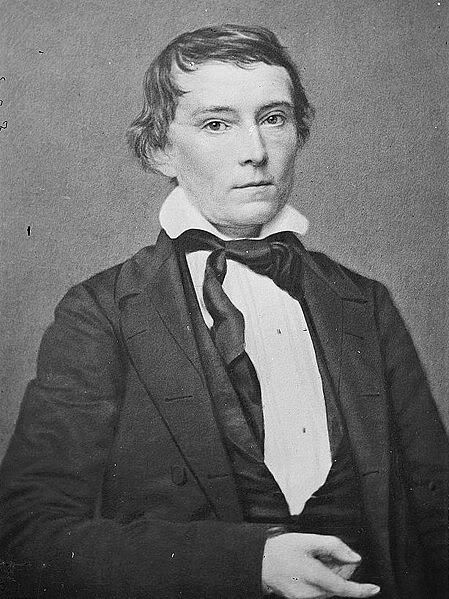The Cornerstone of the Confederacy
The vice president of the Confederacy, Alexander Stephens, was a remarkable man. Sickly (he weighed less than 100 pounds) and cursed with a shrill voice, he nevertheless earned the respect of people across the South by virtue of his penetrating intellect, generous nature (he gave money and aid to the needy, both white and black), and deep affection for the southern way of life.

Unlike most modern politicians, he was a serious and well-educated man. Born poor, he made the most of his opportunities and graduated at the top of his class at Franklin College (later the University of Georgia). As every schoolchild knows, in March 1861 he sought to explain the reasons for the secession of the southern states in an extemporaneous oration known as the Cornerstone Speech.
With respect to slavery and matters of race he said:
The prevailing ideas entertained by [Thomas Jefferson] and most of the leading statesmen at the time of the formation of the old constitution, were that the enslavement of the African was in violation of the laws of nature; that it was wrong in principle, socially, morally, and politically. It was an evil they knew not well how to deal with, but the general opinion of the men of that day was that, somehow or other in the order of Providence, the institution would be evanescent and pass away. This idea, though not incorporated in the constitution, was the prevailing idea at that time.
The constitution, it is true, secured every essential guarantee to the institution while it should last, and hence no argument can be justly urged against the constitutional guarantees thus secured, because of the common sentiment of the day. Those ideas, however, were fundamentally wrong. They rested upon the assumption of the equality of races. This was an error. It was a sandy foundation, and the government built upon it fell when the "storm came and the wind blew."
Our new government is founded upon exactly the opposite idea; its foundations are laid, its corner-stone rests, upon the great truth that the negro is not equal to the white man; that slavery subordination to the superior race is his natural and normal condition. This, our new government, is the first, in the history of the world, based upon this great physical, philosophical, and moral truth. This truth has been slow in the process of its development, like all other truths in the various departments of science. It has been so even amongst us.
Many who hear me, perhaps, can recollect well, that this truth was not generally admitted, even within their day. The errors of the past generation still clung to many as late as twenty years ago. Those at the North, who still cling to these errors, with a zeal above knowledge, we justly denominate fanatics. All fanaticism springs from an aberration of the mind from a defect in reasoning. It is a species of insanity. One of the most striking characteristics of insanity, in many instances, is forming correct conclusions from fancied or erroneous premises; so with the anti-slavery fanatics. Their conclusions are right if their premises were. They assume that the negro is equal, and hence conclude that he is entitled to equal privileges and rights with the white man.
If their premises were correct, their conclusions would be logical and just but their premise being wrong, their whole argument fails. I recollect once of having heard a gentleman from one of the northern States, of great power and ability, announce in the House of Representatives, with imposing effect, that we of the South would be compelled, ultimately, to yield upon this subject of slavery, that it was as impossible to war successfully against a principle in politics, as it was in physics or mechanics. That the principle would ultimately prevail. That we, in maintaining slavery as it exists with us, were warring against a principle, a principle founded in nature, the principle of the equality of men.
The reply I made to him was, that upon his own grounds, we should, ultimately, succeed, and that he and his associates, in this crusade against our institutions, would ultimately fail. The truth announced, that it was as impossible to war successfully against a principle in politics as it was in physics and mechanics, I admitted; but told him that it was he, and those acting with him, who were warring against a principle. They were attempting to make things equal which the Creator had made unequal.
By all means, let's remember this.
Stephens rapidly became disenchanted with the policies of Jefferson Davis, and ultimately became an outspoken critic of conscription and the suspension of habeus corpus. After the war he went back to Congress, and died Governor of Georgia.
Stephens rapidly became disenchanted with the policies of Jefferson Davis, and ultimately became an outspoken critic of conscription and the suspension of habeus corpus. After the war he went back to Congress, and died Governor of Georgia.


2 Comments:
Nice find - there is nothing that more completely condemns shocking evil than the rationalizations of learned men.
I mentioned here once I am somehow related to Lee, and it's for this very reason- his great intellect, ability, and humanity - that I am most ashamed of the fact. A mere monster would have an excuse.
Lovely words from a serious and well-educated douche. Need another Shermans March..those red-necks are getting uppity again.
Post a Comment
<< Home